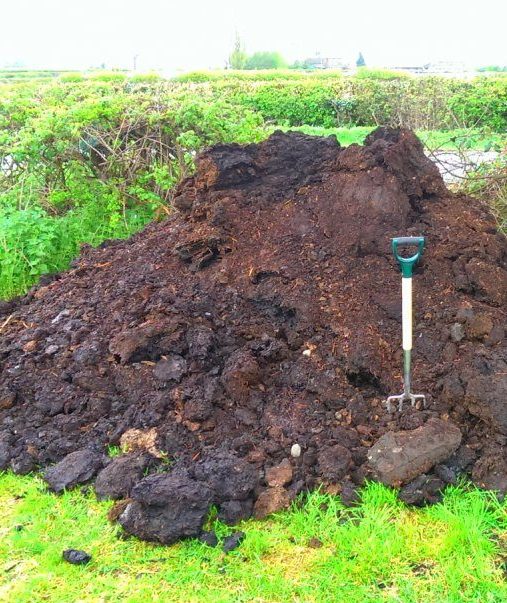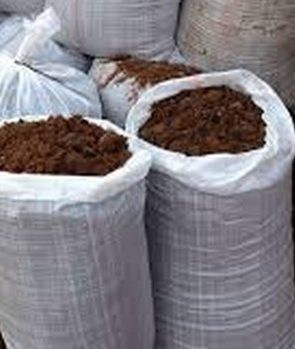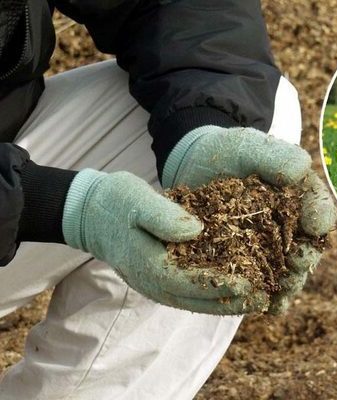Rabbit manure as fertilizer: use, application, storage
Content:
The article describes rabbit manure as a fertilizer: features, rules for collection, storage, use.
Rabbit manure as fertilizer: an introduction
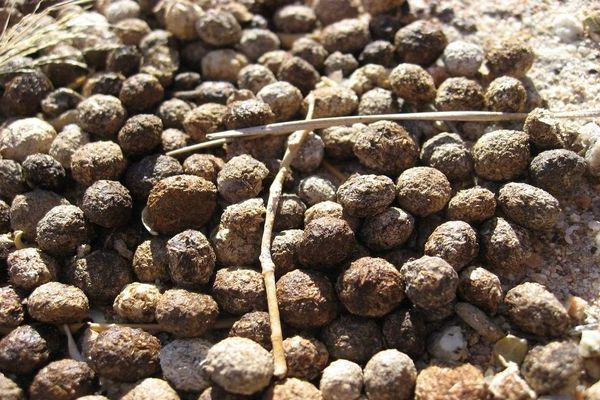
Rabbit manure as fertilizer: photo
Farmers today are very actively using animal waste products. Manure is considered the most popular organic fertilizer, which today is valued in agricultural activities precisely because it contains a huge amount of nutrients and elements that have a beneficial effect on productivity, plant growth and development.
Rabbit manure as a fertilizer for the garden is called “rabbit gold” by farmers, as it is very useful for a wide variety of crops, but it is very difficult to collect it in large quantities. In this article, we will dwell in more detail on what features rabbit manure has, why it is so prized in agriculture, and how to use it correctly in order to really bring the maximum benefit to the plants for which this dressing is applied.
Rabbit manure as fertilizer for the garden: features, composition, collection and storage
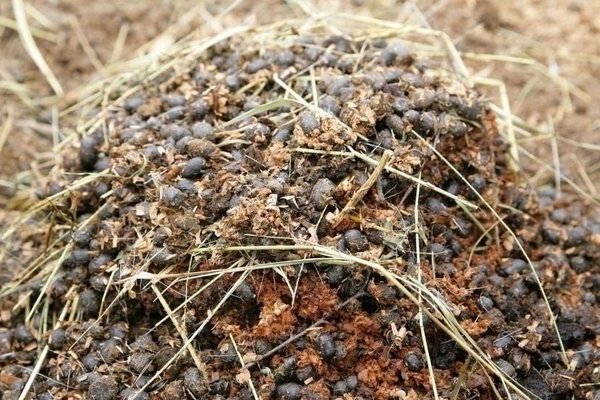
Rabbit manure as fertilizer: photo
Today, in modern agriculture, rabbit manure as a fertilizer for the garden is used as a means that perfectly enriches the land with nutrients and organic substances. Fertilizers, which are made just on the basis of rabbit droppings, have even more useful qualities, and are also ideal for feeding many crops: potatoes and carrots, cabbage and radishes, tomatoes and cucumbers, nightshade crops, as well as fruit trees and bushes ... The droppings impregnate the soil very well, and have a very good effect on it during the preparation stage before cereals and legumes are planted there. Also, rabbit droppings are used by gardeners to feed seedlings. It can be used both outdoors and for cultivating soil and plants in greenhouse conditions.
Compared to other animal and organic waste, rabbit manure as a fertilizer has a huge number of beneficial properties. The farmer does not need to compost the rabbit manure as it does not need to be neutralized. There are practically no dangerous chemical compounds in rabbit manure that could harm humans, and there are no unprocessed weed seeds that could also make rabbit manure less attractive. Rabbits generally try to feed on leaves and vegetation, and they ignore the seeds, therefore, their droppings can be safely used as fertilizer, and do not worry at all about the quality of feeding and, of course, about the quality of products that will be grown thanks to processing with rabbit manure.
It is worth, of course, to pay some attention to the chemical composition of rabbit manure. In general, gardeners and farmers treat manure very well as an organic compound that can be effectively fed to a crop. But it is rabbit manure that surpasses the same horse or cow manure in many respects.It contains more useful components and trace elements than any other organic fertilizer, and all this is achieved due to the fact that rabbits have some specific properties of the body, as well as their diet is somewhat specific. Rabbit dung contains a large amount of nitrogen, potassium and calcium, as well as magnesium and the so-called organic matter, which helps these components to come out and have a positive effect.
How to use rabbit manure to fertilize your vegetable garden?
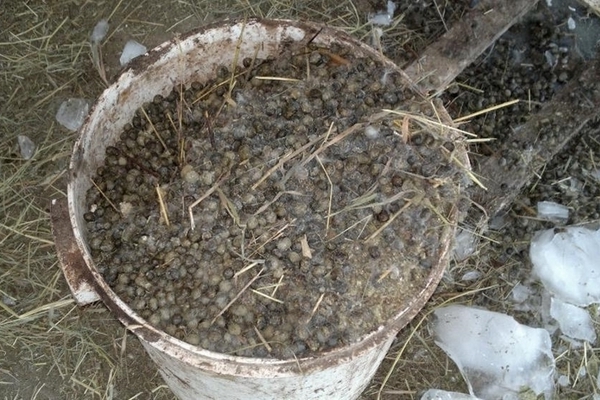
Rabbit manure as fertilizer: photo
In general, there are also several obvious misconceptions of the farmers themselves about rabbit manure as a fertilizer, which should also be mentioned. Many farmers and gardeners who do not have enough experience face some visible problems. One of the myths is that rabbit droppings are completely safe and can be safely used fresh. There is also another misconception - it consists in how and why the manure should be heat treated. So, fresh rabbit droppings can contain urea, and therefore it is only suitable for making groundbaits, but not in order to use it completely. So, if you process the soil in which the plants grow with fresh rabbit manure, then various not very useful components can penetrate into the soil, and then they will accumulate in it, increasing their negative impact. Therefore, not only the composition of the soil itself may suffer, but also the plants, their fruits, which grow directly in this soil, which has been processed.
Gardeners are of the opinion that if you scald manure with boiling water or freeze it, then after that it is quite suitable in order to become a full-fledged organic fertilizer. But in fact, this opinion is completely wrong. As a rule, such processing can make rabbit manure less valuable product, since a very large part of the nutrients and components will be removed from it. You can also devalue manure if it is wrong to dry it out, since all useful components can evaporate from the manure, which in fact stimulate the growth of vegetation.
Advantages, disadvantages
Of course, there are some positive and negative sides to rabbit manure, like any other organic matter. As a rule, gardeners prefer this type of organic matter, as it perfectly nourishes the land, and also prepares it best in order to carry out further cultivation of a wide variety of crops. The fertilizer can be used to feed a wide variety of crops and plants, including rabbit manure for feeding berry bushes, vegetables and fruit trees. Due to the fact that the manure contains an extremely low level of moisture, it is very convenient to store it, and it also perfectly tolerates transportation, if necessary, and if the manure needs to be transported over long distances. But still, as experienced gardeners note, rabbit manure has not only extremely positive qualities.
Some farmers point out the disadvantages of rabbit manure, reducing them to the following characteristics:
- if you use too much fertilizing, then this can only harm the crops being grown. For example, in the soil, there may be an excess of components such as ammonia and methane, which have an extremely negative effect on the condition of the plant and its properties.
- due to their small size, rabbits produce much less manure than larger animals. Because of this, it is almost impossible to collect large quantities of manure.
- the droppings are quite vulnerable to decaying bacteria and the corresponding worms, and it also has a feature of rapid drying, which also negatively affects its condition and useful properties.These disadvantages in general can affect the opinion of the gardener or farmer himself about whether he wants to use this manure as a permanent organic supplement, but otherwise this organic matter is really very useful for plots, both for backyards and for the more extensive - farm ...
To understand how best to use rabbit manure, it is a good idea to first learn the intricacies of collecting and storing the manure. In order for the biological waste of the animals themselves not to accumulate in the cages, they should be equipped with special holes or slots through which the feces will fall down and will not remain inside the cages. It is on the pallets that manure will accumulate. If we are talking about larger farms, then special gutters can also be made in pallets, which will lead into a common container with all the rest of the rabbit manure. It is best to collect the manure daily, and after harvesting, the cages must be very thoroughly cleaned, as this helps to maintain hygiene, you can preserve the general condition of the animals.
Proper storage
It is best to store manure in dry form, while direct sunlight should not fall on it, since in general, manure does not react very well to this, it may even catch fire. Experienced farmers compost manure, because they believe that in this form it is best stored and retains all the most useful components and properties. You can also put manure in small containers or dug holes, pre-mix sawdust or silage there, some food waste or weeds that were collected from the backyard. There is one more rule for storing rabbit manure - the mixture should never dry out. But if suddenly this happens, then it is worth reanimating the fertilizer. It is not so difficult to do this - you can make a special liquid bait for plants from it, and you can also use this liquid bait for its intended purpose.
Rabbit manure as a fertilizer is full of a huge amount of very useful components, which are very important to properly prepare and extract from the manure so that it gives the maximum benefit to the treated plants. Only in this case can it be really effective as a complementary food, as well as high-quality as a fertilizer to increase stress resistance and plant immunity. Experienced gardeners claim that today there are several types of litter treatment, each of which is useful in its own way if we are talking about effectiveness.
We list some types of rabbit droppings:
- tincture - quite effective and suitable for regular feeding of various types of soil
- rabbit droppings powder - used mainly in floriculture
- compost - this type is great for improving the structure of the soil, as well as for improving its composition
- humus - this species can have a beneficial effect on the quality of the soil, as well as to increase its fertility.
The manure-based liquid is a top dressing that is fast acting. This type of rabbit manure is used in order to process vegetable crops that grow in the personal plot. A liquid based on rabbit manure is used after the plant has been well moistened (or rather, the soil has been moistened). Rabbit manure is perhaps the only fertilizer that can be very effective when dry, and therefore if the grower correctly prepares a powder based on rabbit manure, then he can use it to feed flowers, as well as some indoor plants.
Composting is a lengthy process, but it is also the most effective of all. The first thing a grower needs to do to compost rabbit manure is to make a pit in which the compostable layers will alternate.This is necessary so that air can freely penetrate into all parts of the workpiece, and only in this case you can get the most efficient compost. In this case, the heap should not be affected by the sun's rays at all.
As for humus, it is a completely decomposed manure or compost mass, which has a completely different composition and properties. At the same time, humus is a unique combination of inorganic components that are incredibly useful for almost all types of plants and crops. It is an environmentally friendly product, which is consumed in minimal quantities, is easy to store and perfectly transfers all transportation over long distances. At the same time, there are practically no harmful substances in humus, it does not have an unpleasant odor, it is easy to use it for treating areas.
There are several important aspects to consider when talking about how to use rabbit manure. For example, one of the simple but completely ineffective methods is to spread fresh rabbit manure into the soil. However, experienced farmers confirm that this method has absolutely nothing useful in it, and, moreover, in excessive quantities, this can lead to an increased risk of burning vegetables.
It is best to use slightly different methods:
- tincture
- dry droppings
- compost
- humus.
As we have already noted, these types of rabbit manure as a fertilizer for the garden are excellent for cultivating a personal plot at different periods of time, and are quite applicable to different types of crops. It is only important to comply with the norm, not to overfeed the crops, otherwise this will lead to the fact that the plants will get sick, experience discomfort, and will get sick more often.
Video on how to use rabbit manure as fertilizer for the garden


